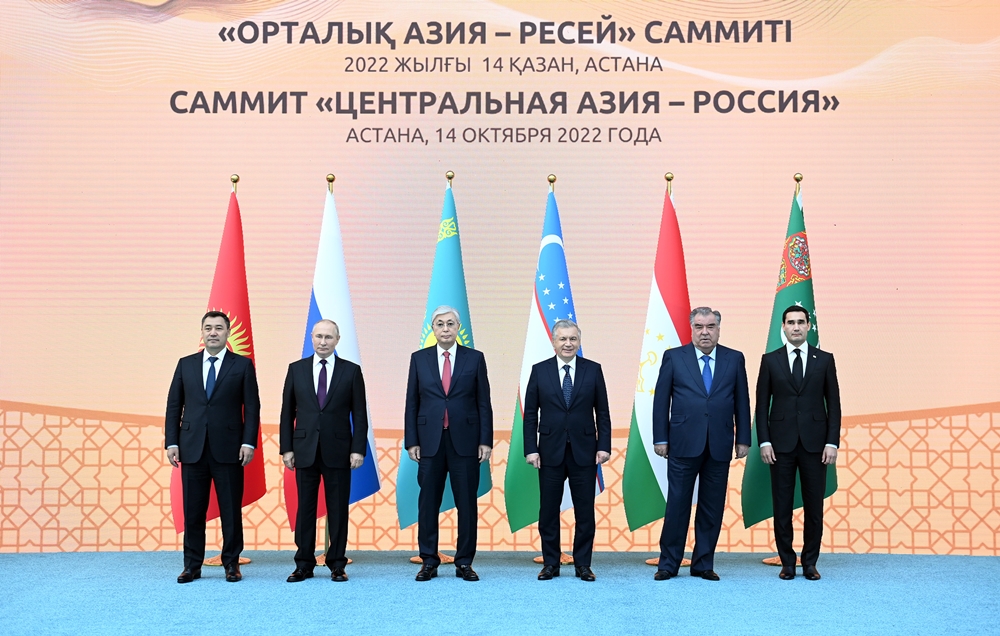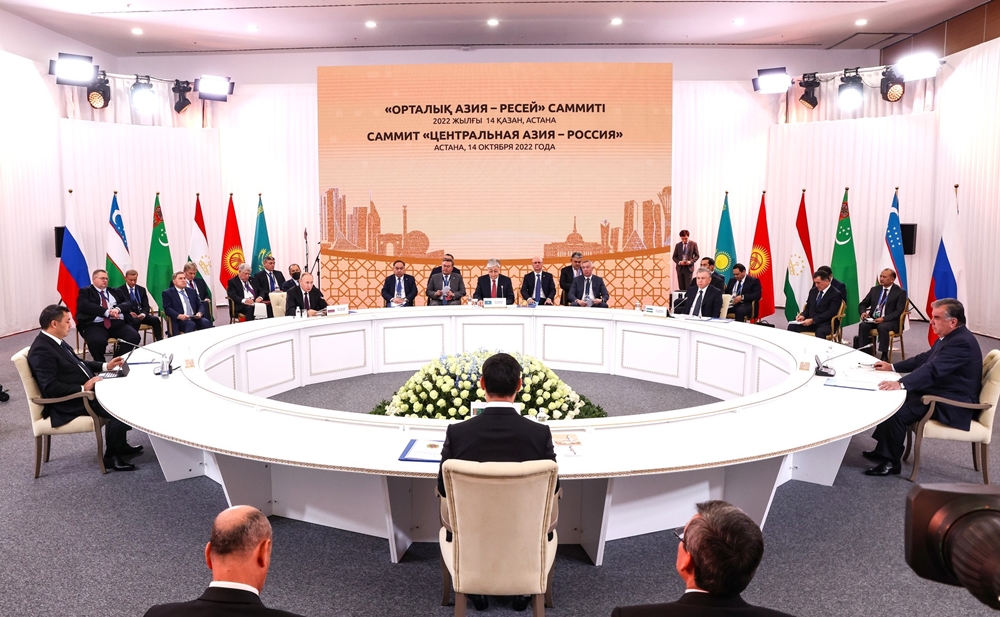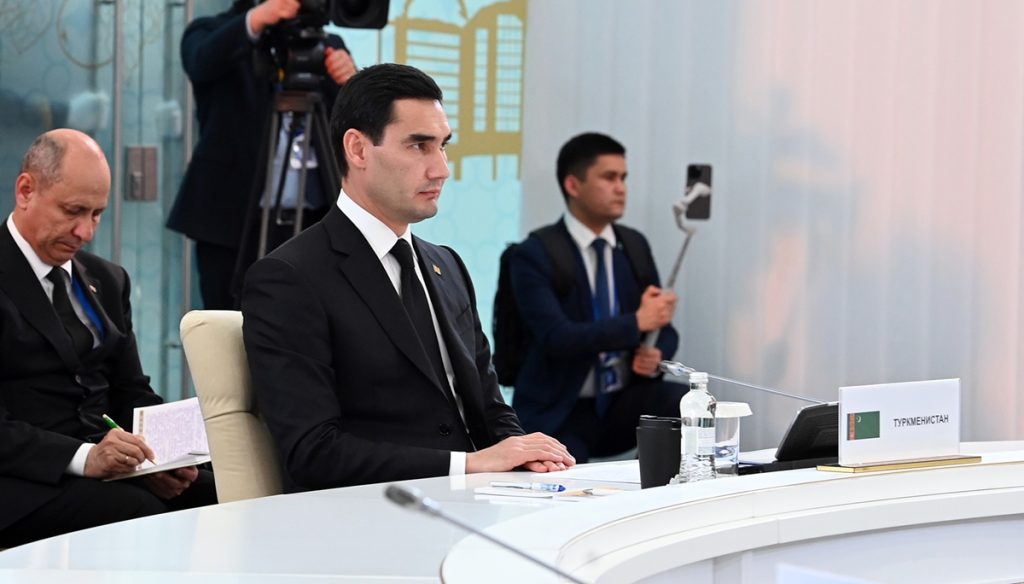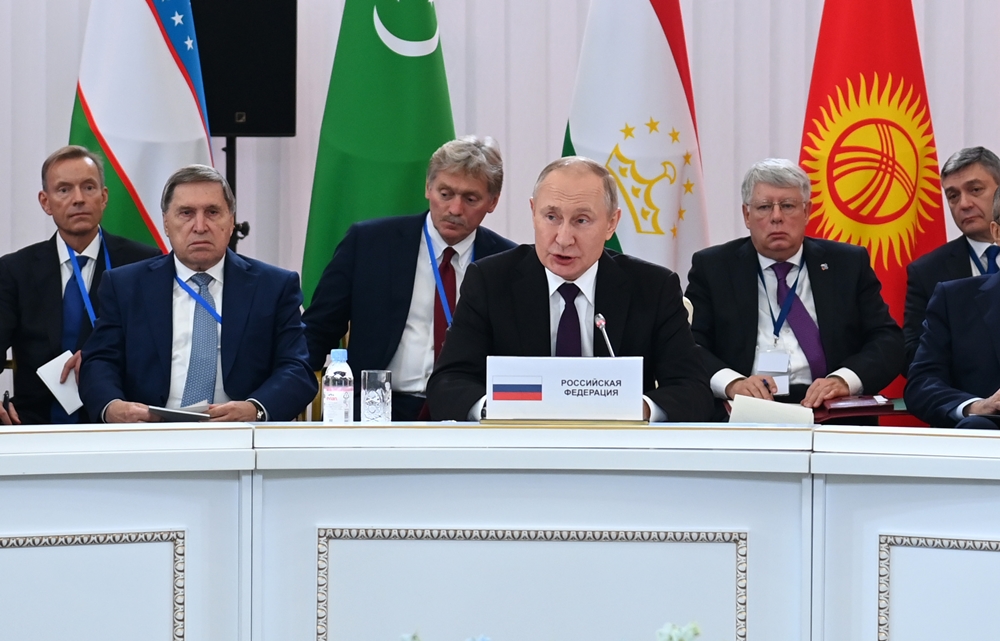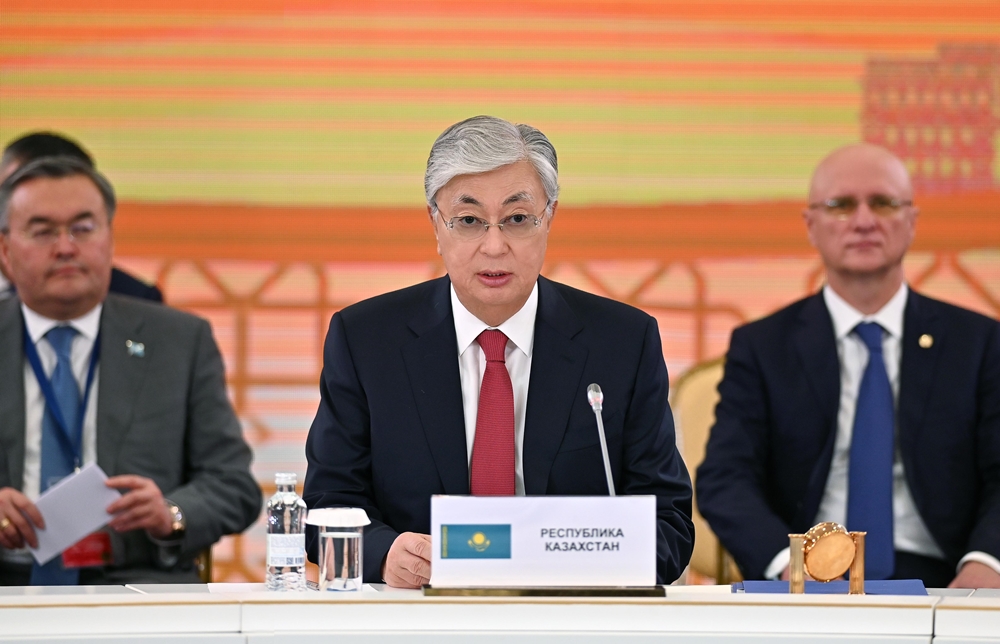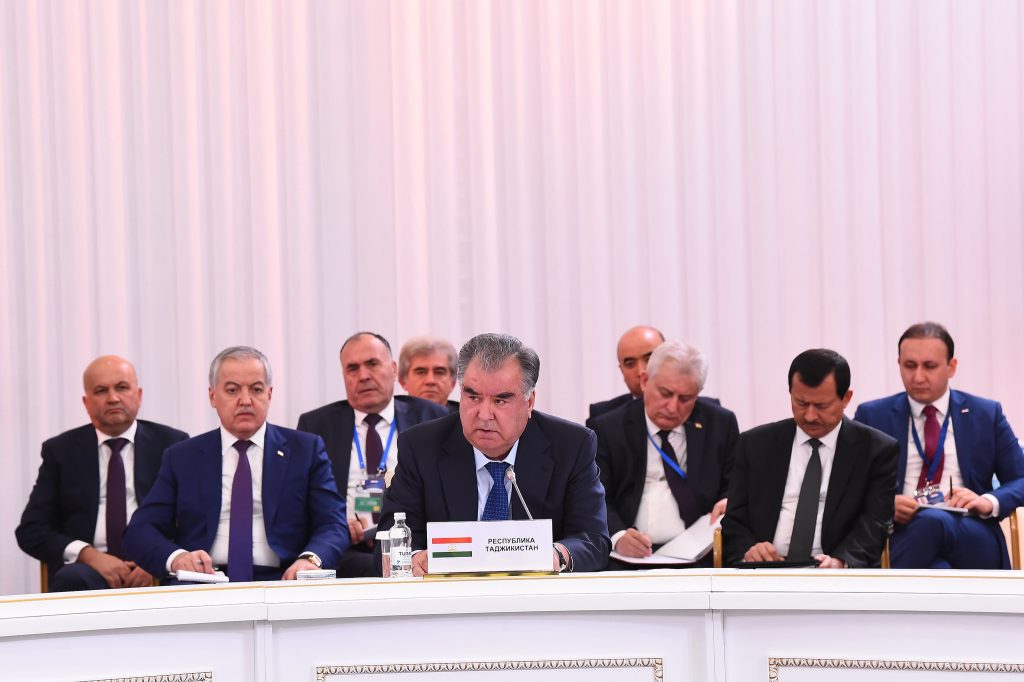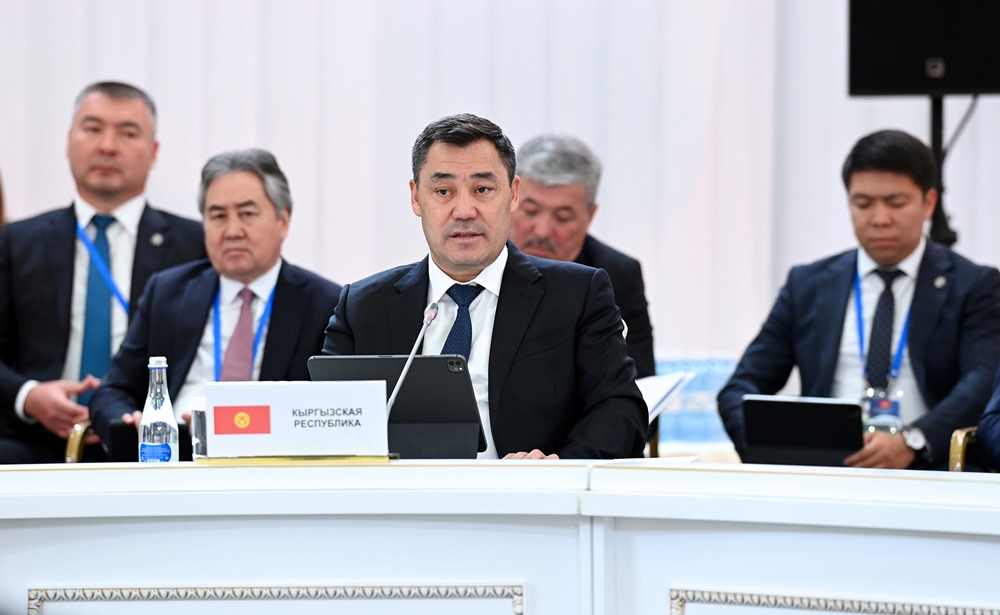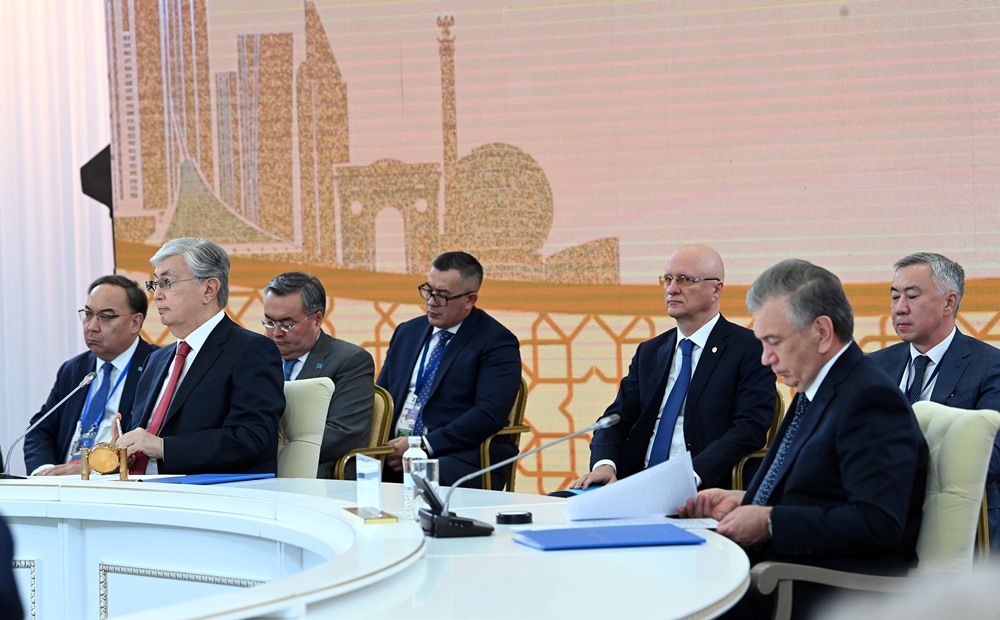nCa Report
On 14 October 2022, Astana hosted the first summit with the participation of the leaders of Russia and Central Asian countries. The meeting, initiated by Moscow, coincided with the 30th anniversary of the establishment of diplomatic relations between Russia and the five Central Asian states.
The agenda of the summit included such issues as ensuring common trade and economic interests in the current geopolitical situation, regional security issues in the context of the situation in Afghanistan.
During the meeting, a constructive and interested exchange of views took place on the main aspects of cooperation between the Russian Federation and the countries of Central Asia.
Along with this, the leaders analyzed the implementation of earlier reached interstate agreements, identified priority vectors for further joint activities.
The need to create a new partnership model in this field, take steps to support small and medium-sized businesses, implement joint projects in the fields of energy, industry, transport and logistics, the agro-industrial complex, etc. were all mentioned during the discussion of issues related to enhancing economic cooperation.
The Heads of State noted the importance of efforts to preserve and strengthen in every possible way the centuries-old ties of friendship, good neighborliness and strategic partnership.
Following the summit, a joint declaration was adopted outlining the main areas of cooperation between the six nations, including trade and economy, security, food security, transportation, energy, ecology, and health.
Speech by President of Turkmenistan Serdar Berdimuhamedov
(Here is slightly paraphrased translation of the speech by President of Turkmenistan at the Russian and Central Asia Summit in Astana. For convenience, the text is divided into subheadings according to the topics covered in the remarks).
Dear Heads of State, dear members of the delegations,
First of all, let me express my gratitude to the President of the Republic of Kazakhstan Kassym-Jomart Kemelevich Tokayev for the hospitality and excellent conditions created for constructive work.
Four directions of political interaction
Today’s meeting marks the continuation of close multifaceted cooperation between the Central Asian countries and Russia on the main items of the world and regional agenda. Among them, ensuring peace, stability and security as a key factor in the successful development of our states, expanding and deepening integration economic and trade ties, addressing social and humanitarian problems is of the utmost importance.
We have to state with regret that the trends in global geopolitics have not been going in a positive way recently. The foundations of international law are being eroded, which affects the effectiveness of the work of the UN and other supporting institutions. The meaning and content of interstate relations is changing. The geography of conflicts, threats of terrorism, extremism and radicalism is expanding.
In these conditions, close, effective cooperation between the Central Asian states and Russia is becoming crucial. Today we need well-coordinated political and diplomatic work, well-coordinated cooperation through special services, the use of information resources, public institutions to create reliable and long-term protective mechanisms that can provide our countries and citizens with peace, tranquility and confidence in the strength of state foundations.
At the same time, it is necessary to intensify joint work in international organizations in this direction, to achieve cohesion and unity in respect and effective implementation of universally recognized norms of international law.
In the regional aspect, I think it is necessary to use preventive measures and tools to prevent potential conflicts as much as possible, using the available levers and experience for this.
We suggest focusing on specific areas:
The first is countering attempts to destabilize the situation in our states;
The second is to provide guarantees of protection against the threats of terrorism, extremism, cyber and biological hazards;
The third is the fight against the artificial introduction of false meanings and moral guidelines into the public consciousness;
The fourth is the prevention of potential negative consequences of the world’s general complication.
In order to intensify joint activities in the above-mentioned areas, we consider it expedient to optimize the regime of six-party consultations between the ministries of foreign affairs. The same applies to the activities of special services and other structures. We propose to instruct ministries and heads of departments to develop algorithms and topics of consultations based on the above tasks.
The situation in Afghanistan
A separate topic on the international agenda is the situation in Afghanistan. I am convinced that the Central Asian countries and Russia are equally interested in stability in Afghanistan. A peaceful, stable, developing Afghanistan is one of the guarantees of the security of our borders, our citizens.
In this context, Turkmenistan welcomes and supports international mechanisms for the political settlement of the situation in Afghanistan, the efforts of Central Asian countries, Russia, Iran, China, and UN missions in the Afghan direction.
The most important issue is the integration of Afghanistan into international and regional economic ties. In recent years, Turkmenistan has initiated a number of major infrastructure projects with Afghan participation. They include Turkmenistan–Afghanistan–Pakistan–India gas pipeline, Turkmenistan–Afghanistan–Pakistan high-voltage power transmission line, Turkmenistan–Afghanistan–Pakistan fiber-optic communication line, railways from Turkmenistan in the Afghan direction.
Through the implementation of such projects, Afghanistan will gain a strategic perspective on economic and social development, as well as the ability to capitalize on its geographical advantages as a link on the continent.
Economic cooperation
The economy is the top priority under the six-party framework for cooperation. We see great prospects here. These are, first of all, such areas as energy, industrial cooperation, textile production, agro-industrial complex, logistics, new technologies, regional trade.
It is necessary to stimulate the business communities of our countries to a closer partnership. Perhaps it is necessary to initiate the creation of a permanent Central Asia + Russia business format, during which various aspects of trade and economic cooperation would be considered.
Transport connectivity
The development of cutting-edge transportation, transit, and communication networks beyond the borders of our nations is crucial. To do this, a sizable transportation and transit infrastructure must be built, spanning the continent of Eurasia and providing access to the global ocean.
Turkmenistan believes that it is necessary to focus efforts on maximizing the potential that opens up to the Central Asian states and Russia in the context of optimizing transport flows in the Eurasian space.
In this context, we should consider activating the North-South transport corridor, which runs from Russia through Central Asia to Indian Ocean seaports. Turkmenistan, as a country that provides the shortest route to the Persian Gulf, to the ports of Iran and onward to India, is ready to start implementing this project.
Humanitarian cooperation
A few words about humanitarian cooperation.
Turkmenistan fully supports the development and deepening of cultural, humanitarian, scientific, educational, sports, and tourism ties between our countries. In this regard, we suggest organizing a Festival of Culture and Arts of Central Asia and Russia next year.
Dear colleagues!
At the meeting of the CIS Council of Heads of State held today, we heard information about the work of the CIS Interparliamentary Assembly, which briefed the main points related to the activities of this important body. In addition to this information and in the context of today’s Summit of the Heads of State of Central Asia and Russia, I would like to emphasize that in May of this year, the first Inter–Parliamentary Forum “Central Asia – Russia” and the Dialogue of Women of our countries were organized at the highest level in Ashgabat on the initiative of the Chairman of the Halk Maslahaty of Turkmenistan Gurbanguly Myalikgulyevich Berdimuhamedov. The Inter-parliamentary Forum has become the basis for organizing our current meeting. However, unfortunately, these events have not been mentioned today. I think that holding such forums seems relevant, first of all from the point of view of the development of our partnership and interaction.
In conclusion, I would like to confirm Turkmenistan’s firm commitment to the development of fraternal, good-neighborly, equal relations between our countries, readiness for further creative cooperation and thank each of the heads of state present for their great personal contribution to this process.
Russia and Central Asia summit will complement the existing forms of cooperation
Vladimir Putin, the president of Russia, emphasized in his address that the “Russia and Central Asia” format will be an addition to the already-existing formats, which include the CSTO, the EAEU, and the CIS.
“The increasingly complicated situation in the world and in the region is also pushing us to activate all the mechanisms of interaction between us, and most importantly, attempts from the outside to hinder the development of our integration in many areas, to disrupt the close ties that have developed throughout history and close interaction in politics, economy, and the humanitarian sphere. In our opinion, truly coordinated joint steps of our countries are in great demand now, both to build up alliance and strategic partnership, and to increase the stability of our economies,” he said.
Putin expressed Russia’s willingness to expand multilateral cooperation with Central Asian countries, particularly in the development of new supply chains, the smooth operation of joint ventures, and the development of alternative logistics schemes.
Speaking about economic cooperation, he cited the following statistics: “Over the past five years, Russia’s trade turnover with the states of the region has doubled to US $ 37.1 billion. According to the outcomes of the first half of the year, mutual trade increased by another 16%. Russia is a leading investor in the economies of Central Asian countries: the total volume of our direct investments is about US $ 5 billion.”
Russia is ready to deepen energy cooperation with the Central Asian region. The creation of generating capacity, the construction of nuclear power plants, the introduction of digital technologies, the expansion of oil transportation routes, the joint development of energy reserves in the Caspian Sea, the construction or expansion of pipelines, increasing coal trade are all potential areas.
According to Putin, Russia’s reorientation of exports and imports stimulates the development of transport corridors throughout Greater Eurasia. “The key task seems to be the arrangement of new trans-Eurasian corridors passing through the territories of your countries: “East–West, North–South, Europe–Western China routes,” he said.
Along with this, the Russian leader mentioned the possibilities of cooperation through the Eurasian Economic Union. “Russia considers various forms of cooperation in the EEU with countries that have not joined our association to be very useful,” he stressed.
Another priority task of cooperation can be a partnership in the field of information security. In this regard, Putin proposed to start implementing projects within the framework of the CIS in the field of digitalization of the urban environment (“smart city”) and public administration (“electronic government”).
In conclusion, Putin commented on the situation in Afghanistan. “A hotbed of tension is really smoldering on our southern borders, fraught with refugee flows, terrorist threats and the spread of extremist ideology,” he said, stressing that it is in the interests of Russia and Central Asian countries to prevent a relapse of the civil war in Afghanistan.
“Of course, we need to work with the current Afghan authorities, you know my position. But this is also the subject of our careful analysis and coordination of our work in this direction. This is extremely important for all our states, and I want to assure you that Russia is ready and will work, as before, in very close contact with you in this direction”, he stressed.
President of Kazakhstan: “Our countries are destined to be together”
President Kassym-Jomart Tokayev, the summit’s chair, stated in his speech that maintaining stability and bolstering security along the region’s whole border perimeter is currently the most crucial task. According to him, the issues of joint fight against terrorism, extremism, illegal trafficking of weapons and drugs, as well as countering various hybrid threats are coming to the fore.
Kassym-Jomart Tokayev presented his vision of further cooperation between Russia and the countries of Central Asia in the context of key dimensions.
“The first is security. Our countries are destined by fate to be together. We must protect our common history and build a common future for the sake of the well-being of our peoples. Stability and security in each of our States directly affects the development of the entire region. Proceeding from the fundamental interests of our states and peoples, I’d like to draw your attention to the importance of developing effective tools to prevent new threats and respond to them quickly,” he said.
Tokayev believes that the existing mechanisms of interaction need systematic improvement. According to him, clear examples are attempts to destabilize the situation in the region, the use of hybrid and information technologies to incite conflicts. In this regard, it is proposed that countries instruct their national security councils to make concrete proposals for the development and establishment of a mechanism for preventive measures. The main focus in this work should be on the exchange of information and early detection of threats.
The head of Kazakhstan, calling the economy the second dimension, invited the summit participants to develop and adopt a new model of economic cooperation between the countries of Central Asia and Russia. According to him, emphasis should be placed on measures to support small and medium-sized businesses, the launch of joint projects in energy, industry, transport and logistics, agriculture.
“It is important to eliminate trade barriers and prevent protectionist measures. We need to step up efforts to develop intraregional trade. Here it is advisable to focus on improving the structure of trade turnover and expanding its nomenclature. Currently, with the development of our production facilities, we can replace many types of foreign products for each other on a mutually beneficial basis. The analysis of export-import operations indicates broad opportunities in this direction,” he said.
Further, Kassym-Jomart Tokayev focused on the third dimension – transport and transit. As he noted, in the conditions of the disrupting traditional logistics chains, the countries of the region need to fully utilize the transit and transport potential.
The head of state underlined that in the modern world, the importance of interaction to prevent negative phenomena in the information space is increasing. “In the age of accelerated development of digital technologies, social networks, and messengers, any careless word can incite hatred and interethnic conflict, particularly among young people,” he stressed, proposing to involve relevant departments and public organizations in active explanatory work.
Tajikistan stands for strengthening cooperation in the fight against security risks
President of Tajikistan Emomali Rahmon spoke in favor of establishing cooperation in the fields of trade, transport and communications, education, humanitarian relations and countering new threats and challenges within the framework of the six-party dialogue.
In the context of security cooperation, in the direction of preventing the spread of extremist ideology, countering the growth of terrorist and extremist groups, drug trafficking and transnational organized crime, Emomali Rahmon called on his counterparts to strengthen coordination of the activities of special services and competent authorities in the region in order to develop and create new mechanisms to jointly combat these threats.
Regarding the political and humanitarian situation in the neighboring Afghanistan, he stressed Tajikistan’s readiness to provide humanitarian assistance to the Afghan people through the country’s logistics centers.
Development of interstate relations with Central Asian countries and Russia is a priority for Kyrgyzstan
“The development of interstate relations with the countries of Central Asia and Russia is a priority for the Kyrgyz Republic, based on the common historical heritage, culture, economy, linguistic and spiritual traditions and values of our countries and peoples,” President Sadyr Zhaparov said.
He noted the need to maintain a political dialogue, find mutually acceptable solutions to pressing issues, and promote interests in international and regional organizations in a consolidated manner.
Then the leader of Kyrgyzstan spoke on the Afghan issue, which remains relevant at the international and regional levels. ” Today, the entire international community is faced with the task of avoiding a repeat of the previous bitter experience and putting an end to this country’s long-running bloody military conflict. Kyrgyzstan, as a traditionally friendly country to Afghanistan, adhering to the principle of non-interference in internal affairs, is interested in a stable and prosperous Afghanistan. We have always made and will continue to make efforts to establish peace in this country,” Zhaparov assured.
In his speech, the Kyrgyz leader also proposed to develop a common strategy for ensuring food security, which would provide an opportunity for the integrated development of the agricultural and processing industry.
“In the future, in our opinion, it is necessary to take joint practical measures to harmonize the regulatory framework on the protection of the domestic market and import substitution to prevent the possible occurrence of a shortage of food products and ensure complementarity,” he said.
President of Uzbekistan supports cooperation between Russia and Central Asia in the field of import substitution and free movement of goods
President of Uzbekistan Shavkat Mirziyoyev said that the Central Asian countries and Russia need to focus on such priority areas of cooperation as ensuring the free movement of goods, substitution of imports from third countries, implementation of joint investment projects and industrial cooperation.
On the Afghan issue, the Uzbek leader called on his colleagues to develop joint measures to support Afghanistan and prevent the challenges emanating from this country.
“We propose to instruct our special representatives for Afghanistan to hold a separate meeting within a month and prepare package proposals on joint measures to pre-empt challenges and provide support to the Afghan people,” Mirziyoyev said, speaking at the meeting.
At the same time, he warned of the consequences of refusing to engage in dialogue with the Taliban government. “We are all well aware of the possible consequences of ignoring this difficult situation and refusing constructive dialogue and interaction with the current, the only authorities in this country,” he added.
Joint statement
(unofficial translation)
Joint statement by the Heads of State of the Republic of Kazakhstan, the Kyrgyz Republic, the Russian Federation, the Republic of Tajikistan, Turkmenistan and the Republic of Uzbekistan on the results of the Central Asia–Russia summit
14 October 2022
We, the Presidents of the Republic of Kazakhstan, the Kyrgyz Republic, the Russian Federation, the Republic of Tajikistan, Turkmenistan and the Republic of Uzbekistan, gathered to commemorate the 30th anniversary of the establishment of diplomatic relations between our countries;
confirming the broad outcomes of interstate cooperation in political, economic, cultural, humanitarian, and other important sectors that were achieved over this period and significant for each of our countries;
noting the mature level of alliance or strategic partnership that has developed between the Central Asian States and the Russian Federation on the basis of respect, equality, consideration of each other’s interests and mutual assistance;
confirming the enduring nature of the age-old ties of friendship and good neighborliness, the key to which is the proximity of cultural and civilizational foundations and traditions in the life of our peoples;
based on mutual intercultural, interreligious and interethnic respect, striving for the further development of comprehensive relations in the interests of prosperity and security, the preservation of values close to us, as well as the identity of the peoples of our states, which is rich in its diversity;
guided by the interests of preserving the cultural and historical heritage and value orientations of our peoples;
noting the importance of Central Asia as a natural “bridge” between the regions of the South and North, East and West in the Eurasian space, contributing to the formation of more advanced, fair economic development models on the continent, consonant with the objective processes of the formation of a multipolar world;
considering it important to combine the potentials of the countries of the region, international organizations and multilateral associations in Eurasia in the interests of building a broad, open, mutually beneficial and equal partnership on the continent;
reaffirming commitment to the fundamental international legal norms and principles fixed in the UN Charter;
reaffirming our common position on the strict observance of the fundamental principle of equal and indivisible security;
guided by the highest interests of our states and peoples;
We declare our readiness to focus our efforts on the following areas:
In the field of political dialogue
We will continue the regular practice of our meetings to discuss common topical issues and key topics on the international agenda, as well as to develop coordinated approaches to them.
We emphasize our common commitment to six-party cooperation in the fields of trade and economy, transport, healthcare, as well as in other sectors of mutual interest.
In the field of security
Against the backdrop of a complex military-political situation in the world, increasing risks, general tension and conflict potential, we advocate dialogue efforts to form a more stable international security architecture based on equality and mutual consideration of the interests and concerns of all parties.
Based on our primary responsibility for ensuring our security, we will continue to encourage six-party cooperation and information exchange aimed at countering terrorism and extremism, illegal migration, illegal drug production and trafficking. We will carry out such cooperation with due regard to the activities of regional and international organizations in strengthening peace and security.
Having considered the situation in Afghanistan, we note that this country is facing a deep socio-economic and humanitarian crisis. It is important to prevent the isolation of Afghanistan in order to continue providing assistance to the Afghan people to avoid further deterioration of the humanitarian situation in that country.
The situation in Afghanistan also actualizes the coordination of our measures in the fight against international terrorist, radical extremist groups and drug crime.
We are convinced that sustainable peace in Afghanistan can be achieved only through the creation of a truly inclusive Government with the participation of the main ethnic and political forces. We will continue diverse cooperation for these purposes.
We stand for coordinated work to neutralize threats in the field of international information security, which are fraught with aggravation of confrontation in the global media space. We recognize the importance of intensifying efforts at the national, bilateral and multilateral levels, including in combating the use of information and communication technologies for criminal purposes.
In the trade and economic sphere
The economic ties of the Central Asian States with the Russian Federation play an important role in ensuring the sustainable development of our countries, the functioning and development of all branches of economic complexes, maintaining the level of well-being of the population and reducing the risks of social tension.
We intend to further strengthen our economic cooperation on a mutually beneficial basis by fostering the expansion and diversification of bilateral trade, increasing industrial cooperation in promising production sectors, and stepping up investment cooperation, including through the use of the potential of regional integration associations. We will promote the implementation of joint programs and projects for the development of priority economic activities.
We will continue to pursue a mutually beneficial state policy in the field of trade, including by eliminating trade barriers, simplifying the movement of labor and capital.
We will take further measures to stimulate mutually beneficial relations between companies and business associations of our countries. We intend to expand the practice of settlements in national currencies, taking into account the interest of the parties.
Taking into account the strategic importance of interregional cooperation, we will promote the development of versatile cooperation of the subjects of the Russian Federation with the administrative-territorial units of the Central Asian states.
Despite the crisis phenomena and restrictions in the global economy, we will promote mutual increase in trade turnover, investments, implementation of socially significant projects, as well as ensuring economic growth and security. We confirm our readiness for coordinated measures to protect against unfair competition and other non-market risks in order to improve the quality of our economic cooperation.
In the field of food security
The complication of the geopolitical situation threatens the stable movement of goods between countries, including those important for agriculture. We believe it is extremely important to ensure the availability of food, access to it, sufficient nutrition of the population and the stability of such supplies.
We believe that expanding agricultural cooperation between our countries, introducing modern technologies, and bolstering agricultural supply chains will provide a solid foundation for food security.
In the transport sector
We reaffirm the crucial role Central Asia plays in providing transport connectivity throughout the Eurasian region, and we declare our willingness to follow an agreed path to enhance our countries’ transportation cooperation and unlock the logistics and transit potential of our states.
We will take joint measures to develop cross-border routes and increase passenger and cargo traffic in order to create reliable logistics corridors and chains to enter regional and global markets. We will encourage the exchange of experience and best practices in the field of digitalization of transportation.
We consider it a priority task to create attractive conditions for the functioning of multimodal transport corridors, including through the development of infrastructure and the introduction of mutually beneficial economic mechanisms to stimulate the transportation of goods by rail and motor transport.
We express our interest in creating a new and joint modernization of the existing transport infrastructure of the Central Asian countries.
We note the efforts of the CIS member States aimed at implementing the Strategy of Ensuring Transport Security in the Territories of the CIS member States when carrying out International Transportation, as well as the Agreement on Information Interaction of the CIS Member States in the Field of Transport Security.
We will do our best to promote the development of existing and the creation of new transport routes, we advocate the removal of artificial barriers, increasing the level of transit potential of our countries, as well as simplifying formalities during control, licensing and administrative procedures for cargo transportation between our countries.
In the energy sector
We support the expansion of mutually beneficial cooperation in the fuel and energy complex and power generation. We will continue to encourage cooperation in the construction and operation of power generating capacities and cross-border transmission lines.
Through the use of cutting-edge low-emission (“green”) technology, the use of fossil fuels, and the growth of renewable energy, we place a high priority on enhancing energy security and the sustainable development of the fuel and energy complex.
In the field of ecology
We advocate achieving an optimal balance between the tasks of socio-economic development and the preservation of the natural environment.
In order to ensure environmental safety, we will continue to develop cooperation in the field of conservation of forests, biodiversity, glaciers and adaptation to climate change, rational use of natural resources, reduction of water and atmospheric air pollution, as well as prevention and elimination of consequences of natural and man-made emergencies.
In the field of healthcare and sanitary and epidemiological welfare
We will make efforts for the dynamic development of national systems in the field of digital transformation of healthcare using the best achievements and experience of our states.
We will continue to actively develop cooperation in the creation of joint national systems in the field of telemedicine, enabling their collaboration for public available and high-quality medical care to the population and the formation of a regulatory legal framework in the field of cross-border interaction in the provision of medical care using telemedicine technologies.
We will support joint scientific research and the creation of medicines with high quality management standards, which will contribute to improving the external security of national health systems.
We will continue cooperation in the field of training and advanced training of medical personnel on the basis of leading educational and scientific organizations.
We are convinced that in the modern world, isolated provision of epidemiological well-being is impossible. We emphasize the urgency of further strengthening the collective monitoring system and rapid response to emergency situations of a sanitary and epidemiological nature.
We will continue to join efforts to strengthen national systems for countering new infections based on common approaches and techniques, monitoring and proactive protection against threats of the spread of infectious diseases, including particularly dangerous ones. Cooperation in the fight against infectious risks is facilitated by scientific cooperation in this area, the exchange of the results of the activities of laboratories engaged in relevant research. The coordinated study of infectious disease pathogens and the development of the regulatory framework also deserve attention.
We express our commitment to the development of international cooperation in the field of biological security in order to consolidate the Convention on the Prohibition of the Development, Production and Stockpiling of Bacteriological (Biological) and Toxin Weapons and on Their Destruction (BTWC).
In the humanitarian sphere
Cooperation in the fields of science, education, cultural and youth exchanges, tourism and interpersonal contacts remains our constant priority.
We confirm our desire to further form an open scientific and educational space with an emphasis on maintaining and promoting youth exchanges.
We will encourage the study and teaching of Russian in Central Asian countries, as well as the study and teaching of Central Asian official languages in Russia, and we will encourage the mutual development of contacts between figures in education, science, literature, and art.
We welcome the creation of an international organization under the auspices of the CIS to support and promote the Russian language, taking into account its important role in our interstate and interpersonal communication.
We will continue to expand cooperation in the field of sports, free from politicization and pressure measures.
We express concern about the growing challenges of our time, which pose a threat to universal values and the unity of society.
We will take all necessary measures to prevent incitement of discord on national, historical, cultural, linguistic or religious grounds.
We urge the preservation of memorials and monuments dedicated to the Second World War’s years, and we will also promote research into and awareness of the heroic contributions of the peoples of Russia and the Central Asian states to this war as well as other crucial historical events for all nations.
We fully support joint participation in international scientific and practical conferences, symposiums, as well as celebrations on the occasion of countries celebrating significant dates from the history of culture, education, science and literature, including anniversaries of outstanding personalities.
In the field of migration
Recognizing the importance of international cooperation in migration policy issues, we express our intention to deepen and develop cooperation in the field of migration by increasing the effectiveness of mechanisms to counter illegal migration, improving migration registration of citizens, creating favorable conditions for migrant workers, their adaptation to the legal, socio-economic and cultural aspects of life in the States of employment.
In the field of information technology and mass communications
We will make efforts to develop and strengthen cooperation in the field of mass communications in order to exchange content, conduct joint events, as well as organize trainings and professional development of journalists from Russia and the countries of the Central Asian region.
We attach great importance to deepening cooperation in the field of digital transformation of various spheres of public life in order to improve the quality of services provided to citizens.
***
We express our gratitude to the President of the Republic of Kazakhstan K.K.Tokayev for the hospitality and the high level of organization of the summit in the Central Asia–Russia format.
///nCa, 16 October 2022
